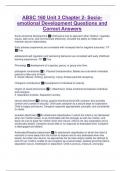ABSC 160 Unit 3 Chapter 2- Socio-
emotional Development Questions and
Correct Answers
Socio-emotional Development ✅Child learns how to approach other children, negotiate
issues, take turns, and communicate effectively. Includes the ability to initiate and
maintain secure relationships.
Early adverse experiences are correlated with increased risk for negative outcomes. T/F
✅True
adolescents self regulation and restraining behaviors are correlated with early childhood
learning experiences. T/F ✅True
Phonology ✅development of a species, genus, or group over time.
phylogenic contribution ✅1. Physical characteristics. Babies are cute which motivates
parents to take care of them.
2. Social reflexes. Smiling, grimacing, crying. Evokes parental caregiving.
Ontogenic contributions ✅Development of individual to maturity
Origins of social phenomena ✅1. Attachment. Close emotional tie between individual
and caregiver.
2. Separation protests .Separation anxiety.
secure attachment ✅A strong, positive emotional bond with a person who provides
comfort and a sense of security. Child uses caregiver as a secure base for exploration.
Child is happy and secure. Caregiver responds appropriately, promptly, and consistently
to needs.
avoidant attachment ✅An attachment classification in which the infant is not distressed
when her mother leaves, is as comfortable with the stranger as with her mother, and
does not rush to greet her mother when she returns. child is not very explorative and is
emotionally distant. Caregiver shows little or no response to distressed child. Caregiver
is disengaged and distant.
Ambivalent/Resistant attachment ✅An attachment classification in which the infant is
reluctant to move away from his mother to explore and is very distressed when she
leaves, but when she returns, he approaches her but also angrily resists her attempt to
pick him up. Child is unable to use caregiver as a secure base, seeking proximity before
separation occurs. Distressed on separation. Child is anxious, insecure, and angry.
, Caregiver is inconsistent between appropriate and neglectful responses. Generally will
only respond after increased attachment behavior from the infant.
disorganized attachment ✅An attachment classification in which behavior is
unpredictable and odd and shows no coherent way of dealing with attachment issues,
often linked with parental abuse or neglect. child is depressed, angry, and non
responsive. Caregiver is erratic; exhibits frightened or frightening behavior,
intrusiveness, withdrawal, and negativity. Very often associated with many forms of
abuse towards the child.
Regulation of emotions and self control ✅soothed by caregivers
sensitive parenting
soothe themselves
predictable routines
How to handle separation anxiety ✅1. Remain calm
2. Set a routine or "leaving schedule" (hug, kiss, goodbye, leave promptly, don't sneak
away).
3.Gradually increase time away
4.Allow child to take a preferred toy or other comfort.
Fear conditioning ✅Caregiver reaction is one of the most important factors contributing
to fears. Impacted by social referencing. The child looks at another's facial, vocal, or
bodily expression as an SD for his/her own behavior. Ex- the child looks at mom to see
how mom is reacting or how she reacts.
Emotion ✅The body's physiological reaction to a situation, your cognitive interpretation
of the situation, communication to another person, and your own actions
Basic emotions ✅An automatic and unlearned set of emotions that arise early in
development and have a biological basis. happiness, sadness, fear, anger, interest, and
disgust.
Emotional display rules ✅Culturally determined norms for when, how, and to whom
emotions should, or should not, be shown.
Emotions are universal, so people all over the world can understand each other's
emotional expressions. T/F ✅False
Emotion schemas ✅All the associations and interpretations that an individual connects
to a certain emotion.
When we experience sadness, we draw on a wealth of associations and memories to
understand what we are feeling. We label the experience, connect it to our memory of
other experiences when we felt sad, and judge whether our expression of sadness is




